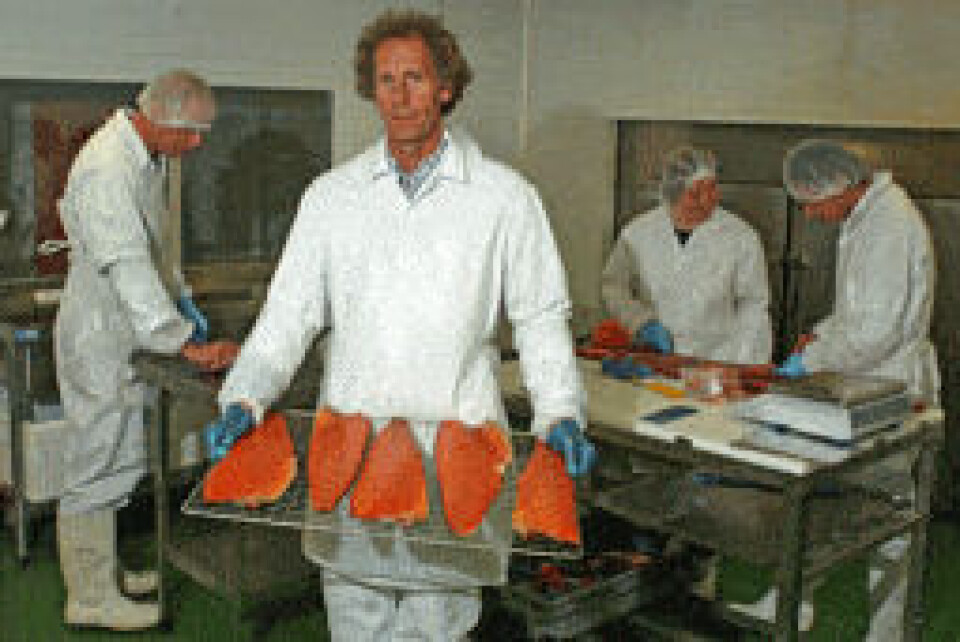
For peat’s sake
Hebridean Smokehouse, which specialises in producing peat-smoked scallops, salmon and sea trout, has reached the shortlist of the Best Food Producer Category at BBC Radio 4’s Food & Farming Awards.
While the taste of its peat-smoked produce has been wining it fans from across the globe for over 30 years, from an aquacultural perspective perhaps the most interesting part of the story is that the smokehouse is selling strains of salmon and seat trout developed from broodstock captured in the lochs and rivers around the island by its owner Fergus Granville.
As Fergus explained to Fish Farming Expert: “I spent 15 years as a fish farmer, producing about a million smolts a year for companies such as Marine Harvest and the Scottish Salmon Company.
“However, it was hard to compete with companies who were producing 10 times that amount and I realised that we’d have to specialise to survive.”
The end result was that Fergus decided to develop his own strains by capturing local broodstock instead of using the Norwegian and Icelandic strains favoured by most of the aquaculture industry. As well as offering a unique selling point, the end result proved to have a number of other advantages.
“It involved spending a great deal of time flailing around in wetsuits in December,” Fergus recalls, “but it was worth it. Local stocks are inured to local parasites – when we conducted a trial using both untreated Icelandic smolts and our own, the former had 80% mortality levels, while only 2-3% of our own died.”
The other advantage is that the fish pose less of a threat to their wild equivalents should they escape.
“If a North Uist fish escapes it will have less of an impact on the genetic integrity of the wild fish around it,” Fergus adds.
“However,” he continues, “it does have one disadvantage – it tends to grilse early, at about 1.5kgs, which is smaller than many markets demand, as well as making them difficult to process, although there have been some improvements made through selective breeding.”
After almost a decade of developing the native strain, Fergus felt that – given the consolidation of the industry – it was probably wise to consider a deal with one of the bigger operators.
“It’s almost untenable to be an independent producer these days, and about a year and a half ago we sold to The Scottish Salmon Company (SSC). We’re still working closely with them though – we’re their preferred customer and take all their native origin sea trout; they rent the sites from us and still have permission to recruit new broodstock from the wild.”
As a result, the smokehouse still has access to the same salmon and sea trout stocks, and smokes around 40 tonnes of Uist seafood a year.
“About 90% of our business is mail order and about 75% of that is delivered within the UK,” Fergus continues, “but we also have customers in Switzerland, China, Japan, the US and Germany.”
“We can't yet get enough native salmon for all of our smoked salmon production, but are assured by SSC that we will in future,” he adds.
The company was selected for the Food & Farming Awards shortlist after listeners to Radio 4’s Food Programme asked people to nominate their favourite producers, workplace cooks, local markets and food heroes.
“It would make a huge difference to us if we win and it’s nice that someone nominated us for the award,” says Fergus, “we’re pleased and many of the locals are proud to – it’s good recognition for the whole island.”
Judges will now visit each finalist in person and the winners will be announced at the BBC Food & Farming Awards ceremony, in Bristol, on 28th April.
Given that the smokehouse employs 14-15 people year-round, rising to around 30 in the run-up to Christmas, it would be great if the nomination, and perhaps the award itself, helps to consolidate these jobs. With luck it should also help to export Fergus's native origin concept.























































